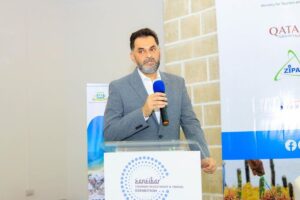Canada, through Global Affairs Canada, has injected a total of 20 million Canadian Dollars (approximately 38bn/-) to empower women and youth in the agriculture sector to combat the consequences of climate change in three regions.
This was revealed in Mkuranga District in the Coast Region on Wednesday when Canadian Minister of International Development, Ahmed Hussen, launched the ambitious groundbreaking ‘Her Resilience, Our Planet’ project aimed at empowering the mentioned groups in adaptation, mitigation, and transition to renewable energy.
The six-year project will be coordinated in the country by Care Tanzania in collaboration with five other partners: WWF, SAGCOT, TGNP Mtandao, Shahidi wa Maji, and the Conservation Farming Unit.
Also read: Over 500 BBT youths pass out military training
Addressing the launching ceremony, the Canadian Minister said the unveiled project will reach over 175,000 smallholder farmers, particularly women, to deal with the effects of climate change in the agricultural sector.
He noted that women and youth are among the groups most affected by climate change; hence Canada has released the funds to enable them to “adapt, mitigate, and transition to renewable energy.”
On his part, the Deputy Minister of Agriculture, Mr. David Silinde, thanked the government of Canada for the grant, saying that the project to support Tanzanian smallholder farmers reflects the existing strong partnership between the two countries.
He added that the project comes at a crucial time when Tanzania is executing various agricultural programs geared towards feeding Africa and the world.
According to the Deputy Minister, Tanzania is currently implementing Building Better Tomorrow (BBT), which involves graduates, an initiative that, in most aspects, aligns with the ambitious groundbreaking project, Her Resilience, Our Planet. The project is expected to uplift women and youth economically as well as contribute to saving the planet.
On his part, the Coast Regional Commissioner, Abubakar Kunenge, said Tanzania is capitalizing on the value chain in the sector; hence the project has come at an appropriate time.
The project will be implemented in the Southern Agricultural Growth Corridor of Tanzania (SAGCOT) clusters, which involve Iringa, Kilolo, Wanging’ombe, Mufindi, and Mbarali districts. These areas are linked to the Ruaha Basin.
Care Tanzania has adopted a comprehensive approach to climate justice that integrates environmental sustainability, gender equality, and social inclusion.
It works towards building resilience, reducing vulnerabilities, and promoting adaptive capacities of communities while ensuring the protection of human rights and addressing systemic inequalities.
As the global climate emergency intensifies, it is estimated that an additional 132 million people will be pushed into poverty by 2030 due to climate change.
Source: allafrica.com














